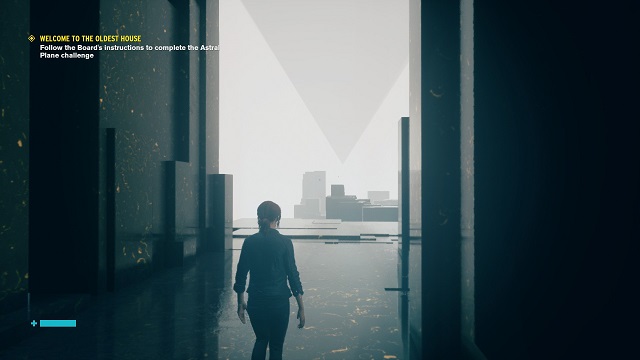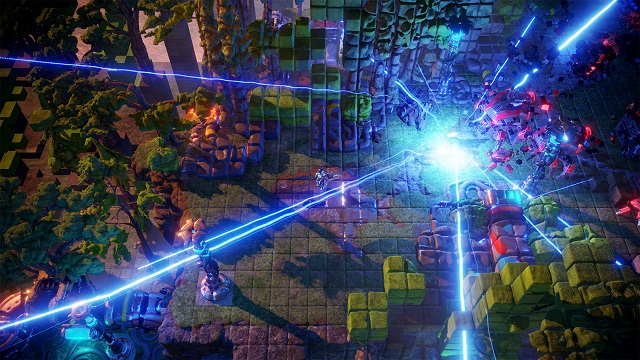The year is 1995. A group of demoscene hackers teams up to form a game studio called Remedy Entertainment. Its first release, a top-down car combat game called Death Rally, brings critical acclaim for the studio and its publisher 3D Realms. The team’s next game, 2001’s Max Payne, cemented them as a legendary hit factory. In 2019, Remedy releases its seventh proper title, Control, to massive critical acclaim. There’s no magic formula at work here. Remedy is just a mature developer that sets the standard for what a third-party developer can be. After nearly 25 years, the team just knows what works because it was given the chance to fail, learn, and grow.
Diving into the Oldest House

When you first boot up Control, you’ll first notice the enrapturing atmosphere. The story has the confidence to start up without setup, trusting the player to follow along with its mind-warping tale (which the studio partially learned from Dark Souls). Any tutorials that do occur happen naturally through gameplay, slowly equipping you with everything you need for the entire experience. Nothing is ever overwhelming, and any frustration falls to the wayside. The player just has this need for answers to Remedy’s expertly posed questions.
ALSO: Control marks over 18 years of Remedy Entertainment reinventing the shooter
For those who played Remedy’s last major game, Quantum Break, it will be like jumping into a familiar set of skin. Developed with similar tech and gameplay, Control iterates on their prior game masterfully. Shooting feels right on the dot and supernatural powers integrate well into the combat. Enemies and thrilling challenge to go up against, even if the bosses can take a bit to get a handle on. Quantum Break is a clear stepping stone to Control. One doesn’t happen without the other. Quantum Break is a divisive title but Control hardly has its detractors. And thankfully that previous title did not sink or discourage the studio; it only thrived to make one of its strongest games yet.
Publishing future blockbusters

Remedy has earned its spot in the industry, but its rise didn’t happen instantly in a bubble. It was born during a much more nurturing time in a much smaller industry. Their first release received lots of attention due to its publisher, which gave them the boost needed to move on to Max Payne. Just like how a musician usually doesn’t craft their biggest hits during their first garage sessions, a game studio isn’t always going to fulfill their full potential the first time out. What would happen to a similar smaller scale of quality in 2019?
We don’t even need to look outside of publisher 505 Games’ catalog for evidence. Back in July, 505 released Horace, a labor of love indie platformer by a pair of developers. That game featured great storytelling and novel platforming. It has an attention-grabbing graphical style and tackles relatable issues in a novel way. It’s a 2019 version of Death Rally, and it received similar critical acclaim. What it didn’t receive was a whole lot of attention outside of the industry bubble.
It’s hard to pinpoint exact sales or user data for Steam games, but there is one pretty reliable metric for engagement: the number of Steam user reviews. Based on that number, we can take an educated guess at how many users have purchased and played the game. In the case of Horace, the game has been out for two months and earned just under 100 reviews on Steam. For comparison’s sake, River City Girls, the more notable midsize release, garnered 169 user reviews in just two days.
At least Horace had a publisher, so it’s probable that the developers can weather this lack of attention. Steam is chock full of other games trying to go at it alone to similarly indifferent results. There are Fight’N Rage and Aztez; modern standards when it comes to 2D beat ’em ups. Platform fighters like Brawlout and Indie Pogo feature characters from beloved franchises and innovative mechanics. And you can’t forget Nex Machina, an absolutely brilliant arcade shooter that garnered so little attention that it caused the developers to declare that “Arcade is Dead!”
In all of the above cases and countless others, the only reason I know of these games is because of my job covering the industry. There are so many games fighting for players attention that it’s burying the potential of smaller studios. Would we have a game like Control today if Death Rally released into the whirlwind chaos of today’s Steam marketplace? We might not, and that’s a real shame because we’re missing out on amazing hits in the future and on the innovative experimental releases of today.
Looking towards the future

The industry as a whole needs to prop up the smaller studios putting out good work. It’s part of the reason why it’s good for indie developers to take Epic Store exclusivity deals. The ability to release a full product without fear of losing everything is a godsend to these studios. As the Ooblets developers said, that money will let them continue to create and stabilize in an era where a single disaster will sink you for good. We don’t get games like Control unless studios have the means to grow and expand. Some will still fail on their own merits, but others will flourish and take gaming into a new era.
So, whether you’re just finishing up Control or haven’t started yet, you should give it a go. As our own review states, it’s “Remedy’s biggest and best game” so far. Once you finish, think about Remedy’s path to that great success: the Microsoft missteps, mobile disasters, and long development times. Think about all that and consider giving a chance to something off the beaten path. Look up reviews, check your Steam recommendations, ask a friend. You might just be funding the next AAA success of 2029.







